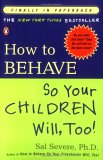Summary | Excerpt | Reviews | Read-Alikes | Genres & Themes | Author Bio

4 Steps to Ending Rude Behavior in Your Kids
by Audrey Ricker, Carolyn CrowderTwo experts share their simple and specific four-step program for ending backtalk and restoring balance in relationships between parents and children, from preschoolers to teens.
"So what? All the other kids get to do it!"
Few behavioral problems challenge and frustrate parents, caregivers, and teachers as
does verbal rudeness in children of any age. Reinforced by the wise-cracking kids on TV
and in the movies, backtalk has become all too common among today's youngsters. But there
is nothing cute about this behavior. Remarks like "Yeah, right," "Big
deal," and "Make me" -- from children as young as three -- get in the way
of real communication between parents and kids, and can also be detrimental to a
child's social and intellectual development.
Now two experts in the field share their simple and specific four-step program for
ending backtalk and restoring balance in relationships between parents and children, from
preschoolers to teens. You'll learn how to recognize backtalk, how to choose and enact a
response that will make sense to you and the backtalker, and when to disengage from the
struggle and move forward. Full of advice and encouragement as well as suggestions on how
to keep track of what works and what doesn't, Backtalk can be put to use
immediately, before you hear another "Whatever."
A note from Audrey Rieker: As a parent in the early 1960s who believed in
progressiveness, I allowed my son to say anything he wanted whenever he wanted. By the
time he was four, he had been expelled from the city's best nursery school for talking
back to the teacher. Most frightening of all, he had begun to accompany his backtalk with
acting-out behavior, such as throwing a chair across the room during an appointment with a
psychologist. That doctor told me that my son was in a phase of self-expression that he
would soon grow out of. But he was so completely out of hand that I was not sure he would
ever get self-control on his own.
Though the psychologist told me I was risking psychological damage to my son, I allowed
my new husband to discipline him verbally when he backtalked. Soon the boy not only became
pleasant to live with but was able to attend a new preschool and make many more friends. I
consider the stopping of my son's backtalk a turning point in his life. I'm sure he would
not have gotten over it by himself, and I believe he would have landed in serious trouble
with teachers, family, and friends.

If you liked Backtalk, try these:

How to Behave So Your Children Will, Too!
by Dr. Sal Severe
Published 2003
Children learn what they live...your children do as you do." Instead of focusing on what children do wrong, this book teaches parents what they can do right.